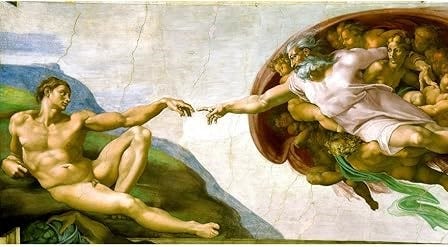“And God breathed into his nostrils the breath of life,” says the sacred author, “and man became a living soul.” For me that is one of the most profound verses in all of Scripture, and one of the most mysterious. It cannot simply be that ha-adam was lifeless and inert before that breath, and then he got to move around. Michelangelo, I think, dramatizes the moment electrically and unforgettably in his Creation of Adam. The first man is powerfully built, with all his physical and spiritual energies latent within him, waiting, his hand extended but limp as it rests on his knee, and one finger almost imperceptibly raised toward God, who is about to touch it to life with his own finger pointing in command. To be a living soul in this full sense is not simply to be alive, like the grass and the flowers and the beasts, but to be alive in communication with God, as the Psalmist says, longingly: “My soul thirsts for God, the living God.”
Let’s tease this out a little. When I was a freshman at Princeton, the professor in our Moral Philosophy course said one day, in the context of Aristotle’s Ethics, that “I don’t suppose anybody believes in the soul anymore.” This was in 1977, and nobody gainsaid him. I didn’t raise my hand, either, but then, I never did; I was too shy. And yet, I’ll do my fellow Princetonians the credit of supposing that many of them would give up their lives for something greater than themselves. But would you give up your soul? Your enemy may have your life in his hands, but he cannot have your soul, unless you have given it to him. The soldier who is put under threat of death unless he betrays his comrades is given the choice: he can have his life, meaning his physical existence, or he can have his soul, the core of his being, all that makes him what he is, or rather what by his created nature he aspires to be. Here the life is but dust in the wind, but the soul is the breath of God in man.
That is why the soul, our Word of the Week, is necessarily a mystery to us. My brain is not the same thing; not even the same kind of thing. How can it be? I am in part in control of my brain: I “use my brains,” choosing to study Russian, let’s say, rather than Sanskrit, or choosing to plunk away awkwardly at the piano for a half hour, rather than to play with Molly the Dog, who curls up beside my foot as I do it. At every waking and conscious moment, I am aware that I am doing things, and that I might choose otherwise. But I’m also aware, when I think about it, that though I can change my mind, meaning what I think about things, or how I choose to deal with things, it’s not so clear that I can change my soul. Perhaps I can betray it. Perhaps I can allow it to curdle, or to wither and die — not absolutely, as a blade of grass will die, but to die that more terrible death of being beyond or beneath all desire for what is good. Can I nourish the soul? Can I cause it to grow and to flourish? Does effort work in that fashion? The saints say no, it doesn’t. Instead it’s a matter of opening yourself up. When Peter says to Jesus, “You have the words of everlasting life,” he isn’t talking about continuation of the same-old same-old. He is talking about the very life of life, the words that bring us into the presence of the living God. What good is it even to breathe on this earth for a thousand years, if you lose your soul?
We don’t know where the English word soul comes from, or its cousins in the other Germanic languages. In Latin, it’s anima, a word that has to do with breathing, the least material thing that strikes us about someone when we see him living. That word is a cousin to Old Norse anda, breath, and Old English ethian, to breathe (the n was lost in Old English before the th: see Latin den[t]s, but English tooth). In the Greek, the Hebrew word for soul is rendered as psyche, a word of unknown origin. Our word psychiatry literally means soul-healing, though I don’t believe that that’s what the doctors try to accomplish, nor do I know whether they should try. The word soul is all over our language, of course, in many expressions. We say that someone is the soul of integrity, not the mind of integrity; and by that we mean that you can hardly think of him without thinking of that virtue, because it is a part of his essence. You can have a great mind, or at least you can have powerful brains, but a small soul, but someone with a great soul cannot be small-minded: the great soul is open to goodness and splendor. We can rummage through our minds to try to remember something our brains have misplaced: I do that sometimes when I rove through the stacks up there, saying, “Now what the heck is that next line?” But soul-searching is entirely different. For one thing, we don’t know what we’re going to find there. But we can still say, with the Psalmist, “Bless the Lord, O my soul, and all that is within me, bless His holy Name.”
W














Share this post